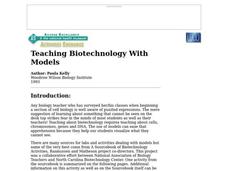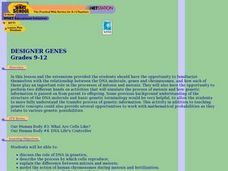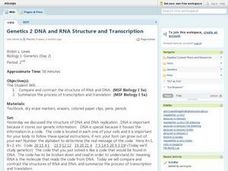Agriculture in the Classroom
Design 'Y'er Genes
How do changes in DNA affect an organism? Scholars explore chromosomes, genes, DNA, and mutations by modeling the DNA of a strawberry. They build a DNA model, then manipulate it to show how changing the genes transforms the strawberry...
Science Friday
Colorful Chromosomes
Everything is in the genes. Individuals observe 14 different traits of themselves. Using pipe cleaners and beads, the learners create models of a chromosome representing their traits. The class then compares and contrasts everyone's...
Lincoln Public Schools
Cell Exploration Activities
Engage young biologists in exploring the mysteries of life with this collection of hands-on activities. Enlisting the help of numerous digital resources, students get an up-close look at the structure of plant and animal cells as they...
University of Colorado
Clay Planets
Why do scientists use models? In the first installment of 22, groups create scale models of our solar system. They then share and discuss their models.
Oklahoma State University
Hairy Heredity
Young scholars learn that heredity comes down to the flip of a coin with this cross-curricular math and science lesson. Using smiley faces as a model, students toss coins to determine which dominant or recessive traits will be passed on...
Curated OER
Biology - Virus Modeling
High schoolers research one of the many types of viruses. They create a 3-D model of the virus they researched with graphics software.
Curated OER
What is the Relationship Between DNA and Cancer?
Students examine the structure and functions of DNA. They discover the effects radon has on one's DNA and how it leads to cancer. They discuss why DNA is so important to us.
Curated OER
Teaching Biotechnology With Models
Students are introduced to biotechnology by using models. The teacher uses A Sourcebook of Biotechnology Activities, Rasmussen and Matheson project co directors. One of the activities in the book is: students use a scale models to very...
Curated OER
DNA Recombination II
Students model recombination in DNA. They color the DNA sample and cut it out. Students use their "restriction enzymes" to cut the DNA into specific fragments. They separate the fragments using the "gel electrotrophoresis." Students...
Curated OER
Extraction of DNA from White Onion
Students conduct lab test with minced onion to determine where chromosonal DNA is located within the cell, and whether or not it can be extracted.
Curated OER
How Cells Duplicate and Why Where Something Can Go Wrong
Seventh graders explore the function of a cell and cell division. In this investigative lesson students construct a 3-D model of a DNA molecule.
Curated OER
Genetic Engineering/Biotechnology
Learners create a paper model of a plasmid and insert a DNA molecule that contains a specific gene into the plasmid. They complete an actual transformation involving E. coli bacterium and relate the two activities to one another.
Curated OER
Nucleic Acid
In this chromosome activity students complete a crossword puzzle by answering questions on DNA, nucleic acids, nucleotides and RNA.
Curated OER
Designer Genes
Students view a video on DNA. They discuss mitosis, meiosis and fertilization. They use strips of paper to simulate fertilization and analyze the genotype and phenotype of the combined chromosomes.
Curated OER
DNA and RNA Structure and Transcription
Students compare and contrast the structure of RNA and DNA.They summarize the process of transcription and translation. The instructional activity uses an inquiry model and the use of codes in DNA.
Curated OER
DNA AND PROTEIN SYNTHESIS IN THE CELL
Learners explore the structure of DNA and the process of DNA replication, describe the process of protein synthesis, recognize the importance of proteins in the human body, and look at how mutations affect protein synthesis.
Curated OER
Teaching Biotechnology With Models
Students will construct models to obtain understanding about the scientific concept. The kinesthetic learners will benefit from the project. There is ample opportunity for all types of learners to be engaged in this lesson.
Kenan Fellows
Unit 1: Introduction to Biotechnology
Biotechnology is big! Introduce the uses of biotechnology to science scholars with a fascinating, fact-filled unit. The first installment in a series of four biotechnology units covers the role biotechnology plays in human and...
Virginia Department of Education
Prokaryotes
Lead your biology class on a cell-sized adventure! Emerging scientists construct models of prokaryotes, then design an experiment to properly grow a bacterial culture. They conclude the activity by viewing the culture under a microscope....
Serendip
From Gene to Protein via Transcription and Translation
DNA carries the codes for creating just the right protein. A well-designed lesson leads pupils through the process from start to finish and everywhere in between. Guiding questions with supporting video help scholars understand the...
Serendip
From Gene to Protein - Transcription and Translation
Learners identify the different steps involved in DNA transcription. In this genetics lesson, pupils complete a worksheet and model the translation process with a paper chain activity. They watch a video on sickle cell anemia and explain...
Curated OER
Control of Prokaryotic (Bacterial) Genes
A nicely formatted set of slides that logically follow and define the structure and function of the genes in Bacteria. The repressor proteins and other gene regulators are listed and diagrams support the explanations of their function on...
Cornell University
The Making of Macromolecules
Compare and contrast macromolecules made from the same elements. Young scholars learn how the structure of a molecule has as much influence on a compound as the elements in the molecule. They experiment with molecular model kits to...
Howard Hughes Medical Institute
Virus Explorer
Most pupils know about the flu, HIV, and other viruses, but they don't know what each actually looks like. This interactive shows their relative size, structure, and allows for comparisons. It stresses the similarities and differences...

























